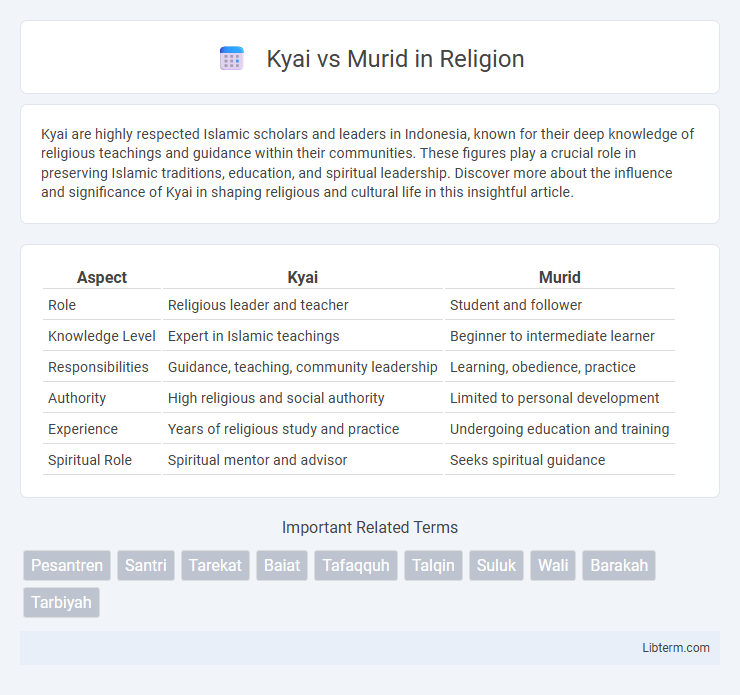Kyai are highly respected Islamic scholars and leaders in Indonesia, known for their deep knowledge of religious teachings and guidance within their communities. These figures play a crucial role in preserving Islamic traditions, education, and spiritual leadership. Discover more about the influence and significance of Kyai in shaping religious and cultural life in this insightful article.
Table of Comparison
| Aspect | Kyai | Murid |
|---|---|---|
| Role | Religious leader and teacher | Student and follower |
| Knowledge Level | Expert in Islamic teachings | Beginner to intermediate learner |
| Responsibilities | Guidance, teaching, community leadership | Learning, obedience, practice |
| Authority | High religious and social authority | Limited to personal development |
| Experience | Years of religious study and practice | Undergoing education and training |
| Spiritual Role | Spiritual mentor and advisor | Seeks spiritual guidance |
Introduction to Kyai and Murid
Kyai are revered Islamic scholars and spiritual leaders in Indonesian pesantren, responsible for religious teaching and community guidance. Murid are students who study under the Kyai to gain religious knowledge, moral values, and spiritual discipline. The Kyai-murid relationship forms the foundation of traditional Islamic education, emphasizing personal mentorship and transmission of religious wisdom.
Historical Background of Kyai and Murid
Kyai, historically revered as Islamic scholars and spiritual leaders in Indonesia, trace their roots to the spread of Islam during the 14th century, playing a pivotal role in educational and religious life. Murid, meaning disciples or students, traditionally studied under Kyai, reflecting a teacher-student dynamic central to pesantren (Islamic boarding schools) culture. This relationship underlines a centuries-old system of Islamic learning that shaped social and religious structures across Java and other regions.
Defining the Role of a Kyai
A Kyai serves as a pivotal religious leader and spiritual guide within Indonesian Islamic communities, responsible for imparting deep religious knowledge and maintaining Islamic traditions. They play a crucial role in shaping the moral and ethical values of their murid (students) through personalized teaching and mentorship, often within pesantren (Islamic boarding schools). The Kyai's authority extends beyond education, influencing social and community matters with their expertise in Islamic jurisprudence and theology.
Understanding the Position of a Murid
The position of a murid in the Kyai-murid relationship is foundational for spiritual and educational growth, where the murid submits to the guidance and wisdom of the Kyai with humility and trust. A murid actively engages in learning, internalizing teachings, and practicing disciplines to develop insight, character, and faith under the Kyai's mentorship. This dynamic fosters a transformative journey rooted in respect, obedience, and continuous personal refinement within Islamic tradition.
The Kyai-Murid Relationship
The Kyai-murid relationship is a cornerstone of traditional Islamic education in Indonesia, emphasizing deep spiritual mentorship and personalized guidance. This bond fosters not only religious knowledge transmission but also moral development and community leadership, with the Kyai acting as a spiritual guide and role model. Mutual respect and trust define this dynamic, enabling the murid (student) to internalize Islamic teachings profoundly within the pesantren environment.
Spiritual Leadership and Guidance
Kyai serve as revered spiritual leaders in Indonesian Islamic communities, offering deep religious knowledge and mentorship that shapes the moral and spiritual growth of their murid (students). Their role extends beyond teaching to providing personalized guidance in worship, ethical conduct, and community involvement, ensuring the transmission of Islamic values and traditions. This dynamic fosters a profound spiritual bond, empowering murid to internalize religious principles and actively participate in sustaining religious heritage.
Educational Interactions and Learning Methods
Kyai, as traditional Islamic scholars in Indonesia, utilize interactive teaching methods emphasizing oral transmission, memorization, and personal guidance in pesantren (Islamic boarding schools). Murid, or students, engage actively through question-and-answer sessions, recitations, and practical applications of religious texts, fostering deep comprehension and spiritual development. This educational interaction relies on a close relational dynamic, where kyai provide tailored instruction, mentorship, and moral exemplification, shaping both the intellectual and ethical growth of murid.
Authority and Obedience in Islamic Traditions
In Islamic traditions, the authority of a Kyai, a respected religious scholar and community leader, is deeply rooted in their extensive knowledge of Islamic jurisprudence and spiritual guidance, commanding profound obedience from Murid, or disciples, who seek their wisdom and blessings. This hierarchical relationship emphasizes the Murid's submission to the Kyai's teachings and moral authority as a pathway to spiritual growth and adherence to Sharia. The interplay between Kyai and Murid upholds communal harmony and preserves the transmission of Islamic knowledge and ethical values within traditional Muslim societies.
Challenges in the Kyai-Murid Dynamic Today
The Kyai-murid dynamic faces significant challenges today due to shifting cultural values and increasing technological distractions that hinder traditional modes of spiritual guidance and learning. The erosion of mutual respect and the rising emphasis on individualism challenge the hierarchical structure essential for effective kyai leadership and murid obedience. Furthermore, modern socioeconomic pressures often limit the time and commitment both kyai and murid can dedicate to deepening their religious knowledge and interpersonal connection.
The Future of Kyai and Murid in Modern Society
The future of Kyai and Murid in modern society involves integrating traditional Islamic leadership with contemporary educational technologies and societal needs. Kyai must adapt to digital platforms for religious teaching while Murid increasingly seek personalized, accessible spiritual guidance beyond conventional settings. This evolving dynamic fosters a hybrid learning environment that preserves religious values while embracing innovation for broader community engagement.
Kyai Infographic

 libterm.com
libterm.com